Lessons from 50 years ago
In commemoration of the 50th anniversary of the declaration of martial law, PhilSTAR L!fe is publishing a series of essays written by personalities who experienced one of the darkest periods in Philippine history.
* * *
Fifty years. That’s a long, long time ago! Yet, there are several incidents from that period that are forever imprinted in my mind and heart.
First was my exposure to poverty. When I was in high school at Maryknoll College, the Maryknoll Sisters encouraged us to visit slum communities near our school and play with the children there. This early encounter opened my eyes to reality in the country.
Then when I was in college, we were encouraged to help survivors of a strong typhoon in an urban poor community. These settlers, then called ‘squatters’ and “eyesores” by Metro-Manila Governor Imelda Marcos, had been relocated to Constitution Hills, very close to an open garbage dumpsite in Quezon City.
We immersed ourselves in the lives of the residents of Constitution Hills. During and after the typhoon, the road was filled with red clayish mud; we had to go barefoot to reach the community.
We slept in their homes during weekends, experienced what it was to be without water, electricity, jobs, education, and roads. The surrounding trees were black with flies, which invariably landed on their food, open wounds, and babies.
We formed a Consti-Hills Committee and solicited help from as many willing hearts as we could find. My neighborhood friends and I drove around our neighborhood to solicit food and old clothes. My mother brought along members of the Catholic Women’s League in our parish to help distribute these to the residents.
Our committee also helped the mothers set up an income-generating project. We collected old telephone directories, and the Consti-Hill mothers folded and pasted the pages into supot or paper bags which they sold to market vendors.
When December came, we organized a caroling group among the residents. I recall that they rode a big dump truck for this special activity. One of the homes we visited was that of the late Senator Jose W. Diokno. He immediately impressed me as a very warm person, as he called some of his family members to listen. He then spent some time talking with us and asked if the carolers knew any nationalist songs. After serving us snacks, he handed us an envelope with P500 in it, a huge amount at the time.
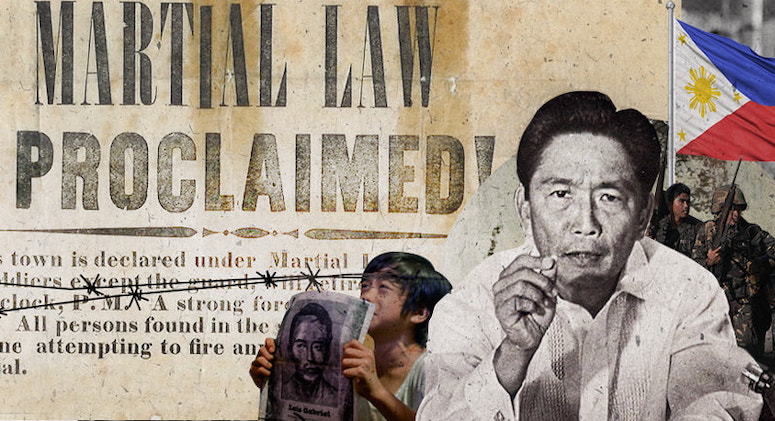
My exposure to the abject poverty of fellow Filipinos combined with my education in political realities. I experienced my first rally in 1971, when our English teacher, Ms. Teresita Quintos, took Maryknollers from different year levels on a school bus to the Old Congress (now National Museum). We protested the shift from a presidential to a parliamentary form of government. Leyte Constitutional Convention delegate Eduardo Quintero alleged that Imelda Marcos had bribed delegates to vote in favor of a parliamentary form of government, which allowed President Ferdinand E. Marcos to become Prime Minister and extend his term. My English teacher eventually became the Presidential Adviser on the Peace Process Ging Q. Deles from 2003-2005 and 2010 - 2016.
Later, as a college student in UP Manila, I was active in the campaign for Student Council officials. We sang “Jimmy Tan, Jimmy Tan, Jimmy Tan para Chairman! Bise-Chairman, si Pagaduan!” at the school auditorium. The full slate of their patriotic Sandigang Makabansa party won. Then martial law was announced on Sept. 23, 1972, and all student councils and organizations were banned. The winning candidates were never able to function as council officers. The term of Marcos had not only been extended by a controversial Constitutional Convention; Marcos’s declaration of martial law in 1972 made him enjoy executive, legislative, and judicial powers for the next 14 years.
To protest the declaration of martial law, we staged a lightning rally inside UP Manila. Each of us chose a specific location in the three-story building. We chanted “Marcos-Hitler-Diktador-Tuta!” on cue about ten times, and quickly dispersed.
News updates at that time were written on minute pieces of paper with the instructions “Pakipasa, pagkabasa.” We hid these and passed them on to others in the safety of the campus comfort rooms.
I graduated from college in 1976, but I did not attend the graduation ceremony. My exposure to poverty, inequality, and the political maneuvering in the country were major influences in my becoming a full-time activist. I soon married fellow activist Ishmael (Jun) Quimpo, Jr. although we were unable to live together for a while, given our respective work.
One early evening, I called him up, using a public telephone. It was then that he said good-bye, saying he would be leaving for the countryside in a short while. As I walked home after that short conversation, the lyrics of “There’s a Place For Us” from West Side Story repeatedly rang in my head. I went home and announced to my family that Jun was leaving soon.
It was my turn to say good-bye to my family the next year. I cried alone on the bus, while carrying Jun’s guitar in hand, on my way to join him in the countryside.
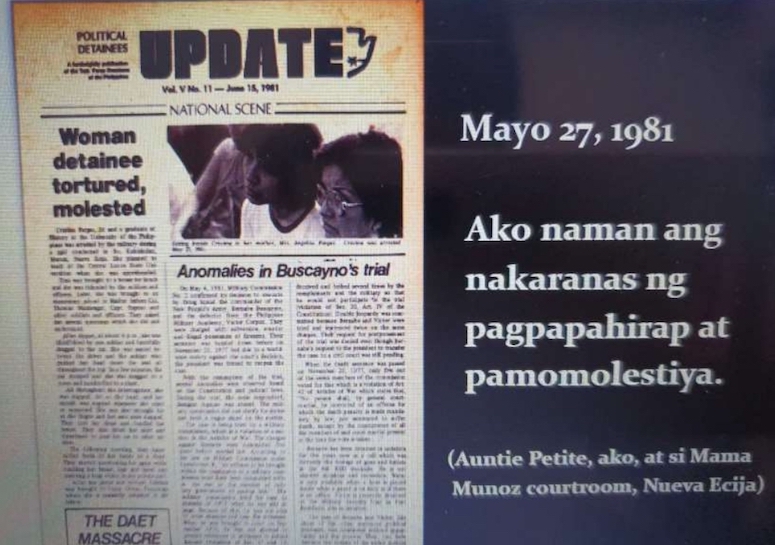
My birthday in 1978 was spent in the home of a very warm peasant family, who took me in, while I was recuperating from numerous sores on my legs brought by scabies. The inflammation was so bad that excruciating pain marked each step I took. At that point, I felt the need to share my thoughts and feelings with a dear college friend. And so, I wrote her a letter. I did not know then that as soon as my friend had received my letter, she would run to my mother to show it to her. I had hoped to spare my mother news of what I was going through.
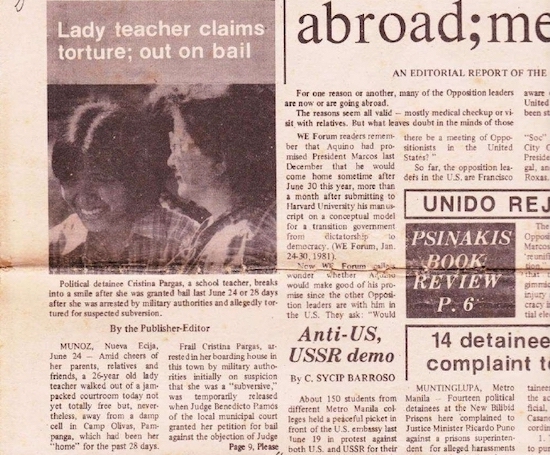
It was that same year when I experienced the fear of imminent death. If I should die, could my Mama take it? If my husband would die, could I take it? For on May 27 of that year, I was arrested.
The martial law period was not a golden era. It was, instead, an era of corruption, economic collapse, extreme poverty, and state-perpetrated brutality.
Then the memories are disjointed: blindfolds, handcuffs, interrogation in a “safe-house,” repeated slapping, repeated loud clapping at the ears, repeated hard thumping on my thighs (which turned black and blue), ripping of my duster, pushing a sharp object onto my chest, fondling of my breasts, insertion of an object in my vagina. Screaming my loudest. Hearing a train pass by. Mercifully amid all these, I remember the empathetic look of a young barrio lass whom the soldiers asked to cook lunch for us.
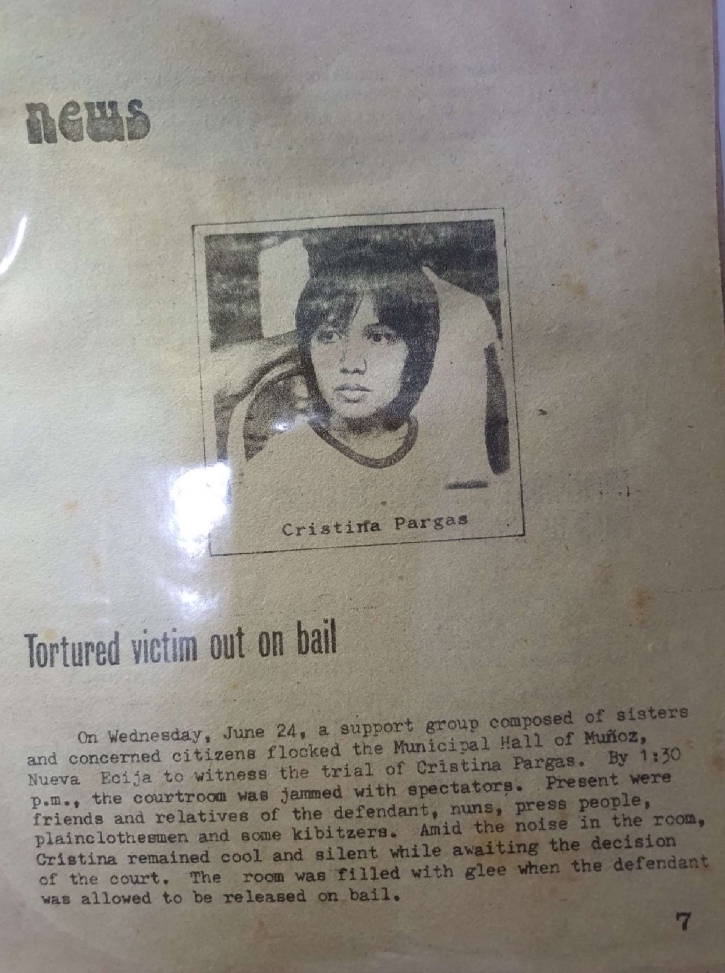
It was only the next morning when the physical torture finally ended. My mother had connected with people she knew in government! I was brought to Camp Olivas, Pampanga, with my eyes still covered. In the afternoon, I was led to a room with a double-deck. My blindfold was removed, and I squinted, blinded by the late afternoon sun. I would be in solitary confinement for almost a month.
Hearings on my case took place at the Muñoz Municipal Court. And although the Judge eventually released me on bail, the military still attempted to detain me again by virtue of a Presidential Commitment Order (PCO). That was in June 1981, and martial law had officially been lifted as early as January 17, 1981, before the arrival of Pope John Paul II. But the PCO was a new invention and used on many activists to keep them in detention for an indefinite period of time.
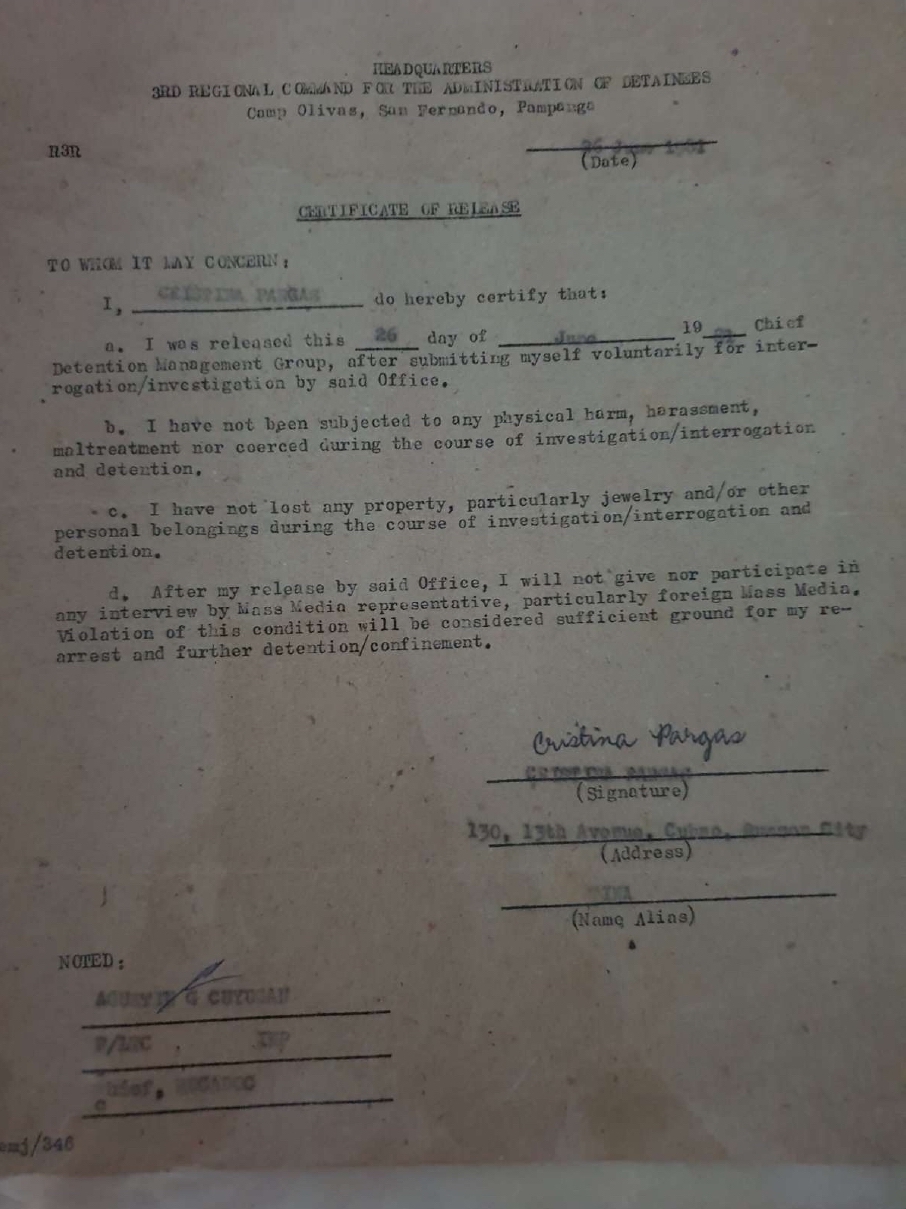
I was made to sign a document saying that I had submitted myself voluntarily for interrogation and that I was not tortured. This was a pre-requisite to my eventual release.
On December 14, 1981, I learned that my husband had been killed. We never got to see each other after my arrest.
So after half a century, here are some lessons I've learned, and shared, from the martial law period:
- The poorest of the farmers provide our society with food, but are themselves deprived of the most basic needs to live a decent life.
- How generous the poorest of the poor can be, when they offered boiled sweet potato for lunch and profusely apologize for not being able to offer rice.
- How courageous the poorest of the poor are, when they offer to carry sick persons like me, in hammocks they made themselves, under the starlit skies, to their own home/s to rest and recover.
- The martial law period was not a golden era.
- It was, instead, an era of corruption, economic collapse, extreme poverty, and state-perpetrated brutality.
- If one truly wants to serve, one must be willing to sacrifice.
- From my late husband: In order to give full meaning and value to life, one must learn to overcome the fear of death.
- Courage is contagious.
Have things changed much after these five long decades?
Well, I have since remarried and now have two children. I became a teacher for the greater part of my life. Despite all my traumatic experiences, some of which I have listed here, I still hope that I have imparted messages of love, courage, and peace to my students.


